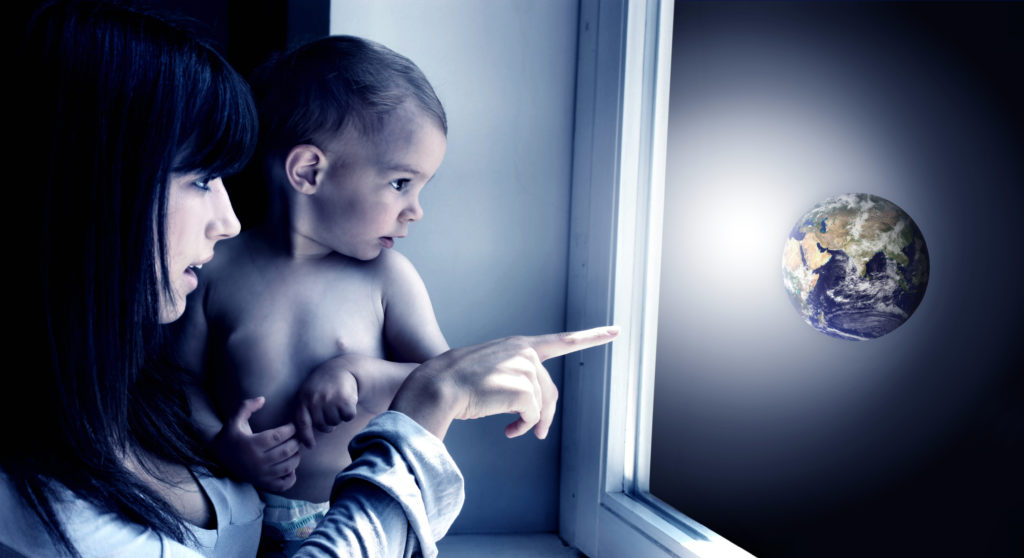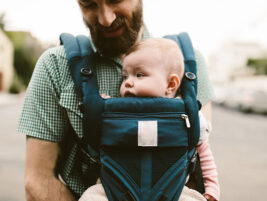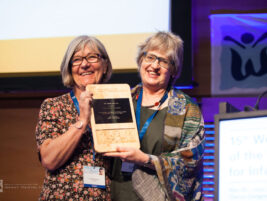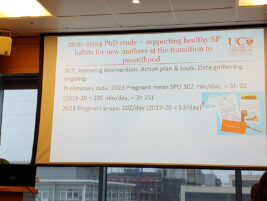I will start by reminding us all, for the young ones among us especially, about the pioneering investigators who showed the crucial importance of Infancy, a period in our development that we, as adults, remember only implicitly.
Let me begin with Darwin who, in 1877, published the «Baby Biographies» and the emergent psychoanalytic theory that led to the general idea that infancy may be an important period. Still, we had to wait until the 1940s, with observations by Godfarb, Anna Freud and Rene Spitz who came to the same conclusion: Without “mothering”, infants die (Anaclitic Depression).
Infancy became the object of scientific study in 1952 when John Bowlby published «Maternal Care and Mental Health». In 1964, Donald Winnicott enlarged the scope of study with his publication, «The Child, the Family and the Outside World». This new knowledge could have remained in the university libraries, beside much of the scientific research. However, thanks to Margaret Ribble’s direct observation of 600 infants in three maternity wards in New York City in 1943, the general public was made aware of the link between the infant’s physiological development and the maternal caregiving environment, with emphasis on the vulnerability of the developing brain. Ribble’s work resulted in a call for Infant’s Rights which was summarized in simple and clear words, accessible to all:
Mothering increases breathing which at birth is still shallow. Deep breathing is important for the brain development. Sucking increases breathing and also satisfies a deep inner need… therefore if the infant cannot suck spontaneously, it should be taught. Baby needs physical contact (“stimulus hunger”) as the precursor of real longing to the love object. Lack or sudden interruption of stimulus hunger, and throw a baby back to a much lower level of physical functioning and emotional withdrawal….(Ribble, 1943)
In 1959, a book for the wider public was written by Selma Fraiberg: “The Magic Years”, thus bringing public attention to the effects of environmental influences on the infant’s social and emotional development. Then, in the 1960’s, many publications focused the infant’s sensory-motor and social competencies, mother-infant communication, and ego development. Thanks to these publications, increasing awareness about infant mental health encouraged some to ask, «What should society do in those situations where an infant’s mental health or infant mental health is endangered?” Indeed, in 1972, Selma Fraiberg received grant support from federal and foundation sources to start a therapeutic model of intervention for mother-infant dyads (The Child Development Project), followed by a small clinical training program at the University of Michigan. Fraiberg’s integration of scientific studies of child development with her well-grounded psychoanalytical training led her to the core concept of interdisciplinary study and intervention in the first years of life with the mother and infant together.
Fraiberg’s next step was the professionalization of Infant Mental Health in 1977, when Fraiberg’s 12 trainees decided to organize a two-day conference on clinical issues of infancy and early parenthood and the dissemination of knowledge about this important period of time and approach to service to other professionals. The creation of the Michigan Association for Infant Mental Health (MIAIMH) was triggered by the necessity to have a sponsor for the conference! MI-AIMH initiated the first interdisciplinary gathering of research and clinical colleague in 1979 and created the Infant Mental Health Journal (IMHJ) with Jack Stack, MD, MI-AIMH Board Member, the first editor-in-chief! The first issue of the IMHJ came out in 1980. Leaders from MI-AIMH later created the International Association for Infant Mental Health (IAIMH) and, along with MI-AIMH, the IMHJ became of the official world publication for the field of infant mental health.
Next, comes a difficult question: To which family does this “baby profession” belong? To the interdisciplinary field of Infant Mental Health or the disciplinary specific field of Infant Psychiatry? Renee Spitz, MD was the first to use the term, “Infant Psychiatry”, in 1950 thus introducing the idea that infant psychiatry is a specialized subfield of psychiatry. In 1974, Justin Call, MD, became the Chair of the American Academy of Child & Adolescent Psychiatry’s Committee on Infant Psychiatry. As we all know, splitting is a severe risk for dysfunction! Therefore leaders from both “camps” decided to join forces with IAIMH and officially merge the associations and approaches. Parent World Association for Infant Psychiatry and Allied Disciplines + Parent International Association for Infant Mental Health = Baby WAIMH! WAIMH is indeed the mix of the healthy development, developmental psychopathology, and psychiatry. Consequently, WAIMH’s identity is about planning for multidisciplinary preventive as well as therapeutic interventions and treatments: Conducting clinical and basic scientific studies, teaching and training, and advocating for infant’s needs and rights.
The idea of having organizations work collaboratively on behalf of babies has continued. For example, the first two editions of the Diagnostic Classification for Infants (DC-0-3) were initiated and supported by ZERO TO THREE (under Emily Fenichel’s special leadership) with input from WAIMH. Today, a third revision is under way and supported by ZERO TO THREE under the leadership of Charlie Zeanah, MD, with participation from the WAIMH leadership, strengthening the work between the two organizations.
At this first half of the 21st century, many more people are aware of infants’ needs, but it is now time for all to think about infants’ rights. In 2012, the WAIMH Ethics Committee, led by Bob Emde, MD and Tuula Tamminen, MD, brought to the Board a preliminary comprehensive report looking at the need to specify Infant’s rights, beyond what had already been included in the United Nations Convention on the Rights of the Child (CRC). The Board’s decision was to go for it. Committee members composed several drafts of the Declaration of Infant’s Rights (DIR) and in the beginning of 2014, the WAIMH Central Office sent out a survey to all members asking the question, “Do we need such a Declaration?”. The majority answered YES, because:
– The CRC does not include contemporary knowledge from the neuroscience field about the impact of early experience on brain development
– The CRC does not focus on what is unique about needs during the first three years, nor takes into account the infant’s unique nonverbal ways of expressing their feelings and their perceptions of their environment
– The Infant’s needs and rights are often overlooked in the midst of conflicted priorities for rights of older children and parents (custody disputes)
– In spite of the CRC, many societies around the globe pay insufficient or no attention to infants, especially in times of stress and trauma
Our final goal is to have the Declaration of Infant’s Rights (DIR) become a Convention for the Rights of Infants (CRI) that will guide policies to support mothers, fathers and caregivers and give value to babies in contexts of risk and violence.
The DIR is divided into two parts:
- The Infant’s basic rights, that should be endorsed everywhere, regardless of society and cultural norms
- Social and Health Policy Areas to be informed by the basic principles expressed in the Declaration of Infant’s Rights, that are more sociocultural context-dependent and take into consideration the fact that in nonWestern countries, hunger, diseases, high mortality of mothers and babies, war, infanticide, abandonment, are still common
Appendix A: Endorsement of the 10 principles of the UN Convention on the Rights of Children 1990 and 2005 General Comment No. 7 Appendix B: Endorsement of the UN Millenium Development Goals.
I. Basic Principles of Infant’s Rights (Birth to three years of age)
- The Infant by reason of his/her physical and mental immaturity and absolute dependence needs special safeguards and care, including appropriate legal protection.
- Caregiving relationships that are sensitive and responsive to infant needs are critical to human development and thereby constitute a basic right of infancy. The Infant therefore has the right to have his/her most important primary caregiver relationships recognized and understood, with the continuity of attachment valued and protectedespecially in circumstances of parental separation and loss. This implies giving attention to unique ways that infants express themselves and educating mothers, fathers, caregivers and professionals in their recognition of relationship-based attachment behaviors.
- The Infant is to be considered a vital member of his/her family, registered as a citizen, and having the right for identity from the moment of birth. Moreover, the Infant’s status as a person is to include equal value for life regardless of gender or any individual characteristics such as those of disability.
- The Infant has the right to be given nurturing that includes love, physical and emotional safety, adequate nutrition and sleep, in order to promote normal development.
- The Infant has the right to be protected from neglect, physical, sexual and emotional abuse, including infant trafficking.
- The Infant has the right to have access to professional help whenever exposed directly or indirectly to traumatic events.
- The Infant with life-limiting conditions needs access to palliative services, based on the same standards that stand in the society for older children.

II. Social and Health Policy Areas to be informed by the Basic Principles of Infant’s Rights
Policies that support adequate parental leave so that parents can provide optimal care for their infants during the crucial early years of life
Policies that minimize changes in caregiver during the early years of development
Policies that promote the provision of informational support to parents regarding the developmental needs of their infants and young children
Policies that recognize the importance of facilitating emotional support for mothers, fathers, and caregivers, as an important component of fostering the optimal development and wellbeing of the Infant
Policies that promote access to evaluation and treatment of risks to development by trained professionals who are culturally sensitive and knowledgeable about early development and emotional healthPolicies that provide access to palliative services to infants with life-limiting conditions.
Policies that assure adequate circumstances, including time for mothers, fathers, caregivers to get to know their infants and become skilled in providing for their infant’s care and comfort, throughout the support of their family and community. The right for parental leave, and its duration, should be valued by the society, in a way that fits its contextual reality.
Policies that provide access to relevant early educational and psychological opportunities and programs that promote good-enough relationship experiences and thus, enhance cognitive and socio-emotional development.
Policies that ensure the provision of prompt access to effective mental health treatment for mothers, fathers, and caregivers that alleviates infants’ suffering and better assures optimal development for the child.
Policies that allocate resources for training and supervision for caregivers in infant institutions, foster care professionals and foster parents, as well as resources for assessing and treating foster care infant’s emotional and developmental status.
Appendix A.
WAIMH endorses the 10 principles of the UN Convention on the Rights of Children (as passed by the General Assembly of UN in 1989, and activated in Sept. 1990) that is:
- The child shall enjoy all the rights set forth in this Declaration. Every child, without any exception whatsoever, shall be entitled to these rights, without distinction or discrimination on account of race, colour, sex, language, religion, political or other opinion, national or social origin, property, birth or other status, whether of himself or of his family.
- The child shall enjoy special protection, and shall be given opportunities and facilities, by law and by other means, to enable him to develop physically, mentally, morally, spiritually and socially in a healthy and normal manner and in conditions of freedom and dignity. In the enactment of laws for this purpose, the best interests of the child shall be the paramount consideration.
- The child shall be entitled from his birth to a name and a nationality
- The child shall enjoy the benefits of social security. He shall be entitled to grow and develop in health; to this end, special care and protection shall be provided both to him and to his mother, including adequate pre-natal and post-natal care. The child shall have the right to adequate nutrition, housing, recreation and medical services.
- The child who is physically, mentally or socially handicapped shall be given the special treatment, education and care required by his particular condition.
- The child, for the full and harmonious development of his personality, needs love and understanding. He shall, wherever possible, grow up in the care and under the responsibility of his parents, and, in any case, in an atmosphere of affection and of moral and material security; a child of tender years shall not, save in exceptional circumstances, be separated from his mother. Society and the public authorities shall have the duty to extend particular care to children without a family and to those without adequate means of support. Payment of State and other assistance towards the maintenance of children of large families is desirable.
- The child is entitled to receive education, which shall be free and compulsory, at least in the elementary stages. He shall be given an education which will promote his general culture and enable him, on a basis of equal opportunity, to develop his abilities, his individual judgement, and his sense of moral and social responsibility, and to become a useful member of society. The best interests of the child shall be the guiding principle of those responsible for his education and guidance; that responsibility lies in the first place with his parents. The child shall have full opportunity for play and recreation, which should be directed to the same purposes as education; society and the public authorities shall endeavor to promote the enjoyment of this right.
- The child shall in all circumstances be among the first to receive protection and relief.
- The child shall be protected against all forms of neglect, cruelty and exploitation. He shall not be the subject of traffic, in any form. The child shall not be admitted to employment before an appropriate minimum age; he shall in no case be caused or permitted to engage in any occupation or employment which would prejudice his health or education, or interfere with his physical, mental or moral development.
- The child shall be protected from practices which may foster racial, religious and any other form of discrimination. He shall be brought up in a spirit of understanding, tolerance, friendship among peoples, peace and universal brotherhood, and in full consciousness that his energy and talents should be devoted to the service of his fellow men.
Additionally, WAIMH endorses the points published in 2005 by the UN Committee on the Rights of the Child as “General Comment No. 7”,
that emphasize the need to include all young children i.e. at birth throughout infancy, during the preschool years, as well as during the transition to school. Through this general comment, the Committee made clear that young children are holders of all rights enshrined in the Convention and that early childhood is a critical period for the realization of these rights, where parents and state parties play a major role. Assistance to parents is also mentioned as a right of the young child. A special section is dedicated to young children in need of special protection.
Appendix B.
As a background for the Declaration of Infant’s Rights (DIR), WAIMH also endorses the United Nations Millennium Development Goals that include:
- The eradication of extreme poverty and hunger
- The achievement of universal primary education
- Gender equality and women’s empowerment
- The reduction of child mortality
- Improvement of maternal health
- Combating HIV/AIDS, malaria and other diseases ensuring environmental sustainability
- Ensuring global partnerships for development.
This draft will go through editing in terms of legal wording, during the coming autumn 2014, and the final version will be sent to all of you.
Key documents underpinning the Declaration of the Rights of the Child
Bartlett, S. (2005). An Alternative Model for Responding to Children in Poverty: The Work of the Alliance in Mumbai and Other Cities. Children, Youth and Environments, 15(2), 342-355.
Bernard van Leer Foundation (2009). Realising the rights of young children: progress and challenges. Early Childhood Matters, No 113. Council of Europe: Commissioner for Human Rights. www.coe.int/t/commissioner
Irwin, L. G., Siddiqi, A., & Hertzman, C. (2007). Early Child Development: A Powerful Equalizer. Final Report for the WHO’s commission on the Social Determinants of Health.
MacNaugthon, G., Hugues, P., & Smith, K. (2007). Young children’s rights and public policy: Practices and possibilities for citizenship in the early years. Children & Society, 21(6), 458–469. NGO Group for the Convention on the Rights of the Child www.childrightsnet.org
Office of the High Commissioner for Human Rights. The Declaration of the Rights of the Child. (adopted by the General Assembly of the United Nations, 1959).
Ribble, M. (1943). The Rights of Infants. New York: Columbia University Press.
The Office of the United Nations High Commissioner for Human Rights. (2011). The Rights of Vulnerable Children Under the Age of Three. https://www.europe.ohchr.org/Documents/ Publications/Children under_3__webversion.pd.f
The UN Committee on the Rights of the Child. www2.ohchr.org/ English/bodies/crc/index.htm
The UN Committee on the Rights of the Child’s General Comment on implementing child rights in early childhood: https://bit.ly/JcMoNX
Authors
Keren, Miri,
MD, President of WAIMH,
ofkeren@zahav.net.il,
Israel








